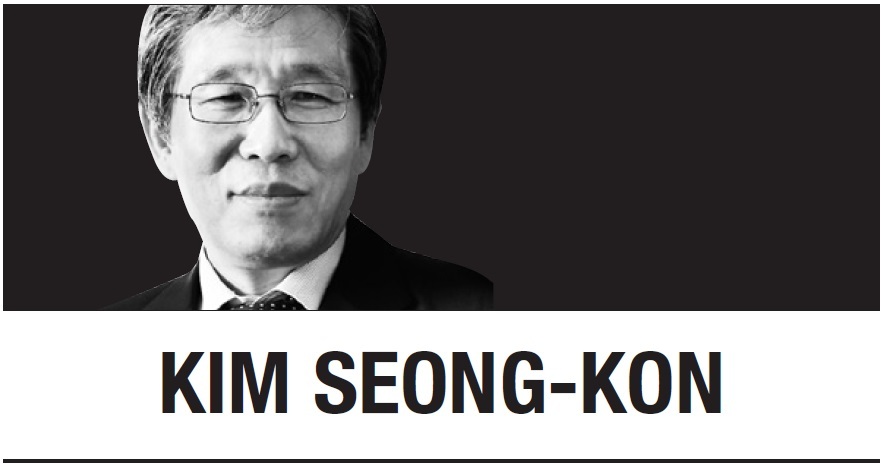[Kim Seong-kon] Zombies and factional scuffles in “Kingdom”
By Kim Seong-konPublished : Jan. 7, 2020 - 17:06
 Netflix’s original series “Kingdom” is a zombie drama set in the Joseon era right after the Japanese invasions of Korea between 1592 and 1598. Adapted from the webcomic “The Kingdom of the Gods,” the series depicts Joseon society presumably in the late 16th or early 17th century when factional brawls were undermining the kingdom.
Netflix’s original series “Kingdom” is a zombie drama set in the Joseon era right after the Japanese invasions of Korea between 1592 and 1598. Adapted from the webcomic “The Kingdom of the Gods,” the series depicts Joseon society presumably in the late 16th or early 17th century when factional brawls were undermining the kingdom. The story unravels an intricate web of power struggles between Prime Minister Cho Hak-ju, the father of Queen Cho, and other Cabinet ministers who oppose him.
Amid intense power politics, a rumor circulates in the palace that the king is either dead or not normal, infected with a horrifying disease that has turned him into a monster-like creature. The truth is that the king has become a zombie that devours human flesh when he awakes after sunset.
However, to wield political power by taking advantage of the situation, Prime Minister Cho denies the rumor and prevents visitors from entering the king’s quarters.
To investigate the king’s rumored disease, Prince Lee secretly visits Dongnae, where the king’s physician runs a clinic. There, Prince Lee finds out that a zombie-infested body the physician brought from the palace has infected the whole village, turning many villagers into zombies. Prince Lee does his best to protect those who have survived the deadly zombie plague.
Meanwhile, Prime Minister Cho arrests and tortures his political opponents ruthlessly. He even accuses Prince Lee of being a traitor who has conspired to kill the king and sends royal guards to Dongnae to arrest him. Prince Lee and his followers barely manage to escape to a nearby town, where they try to fight the rapidly spreading zombie plague and stop the political conspiracy to kill the prince. Season 1 of “Kingdom” ends there.
Although Season 2, scheduled to premiere in March 2020, will reveal more stories in detail, Season 1 has already revealed themes and motifs charged with sociopolitical implications.
For example, the king has secretly turned into a hideous monster that lives on the flesh of the people he has to protect. To make matters worse, he has become a puppet controlled and manipulated by the powerful Prime Minister Cho and his daughter, Queen Cho.
During the Joseon Kingdom, it was common for the king’s in-laws to wield political power, often making the king a puppet. It is also noteworthy that the king himself is the first one who spreads the zombie plague. It is also hinted that Prime Minister Cho is responsible for the king’s strange illness in the first place. The kingdom is doomed in every sense.
Viewers witness ruthless factional skirmishes among politicians and Cabinet ministers even though the nation faces a crisis. During the Joseon era, politicians, sharply divided by factions, slandered their political enemies, accused them of treachery, and tortured them brutally. Then they massacred not only their enemies’ families and in-laws, but also their relatives, wiping out their entire genealogy. Their primary goal was to seize political power at all costs; they were not interested in the welfare or future of their kingdom.
In the drama, Prime Minister Cho and his followers hide the king’s horrible disease for political gain. Local magistrates are also hopelessly incompetent, corrupt and irresponsible. Seriously lacking “noblesse oblige,” they desert the villagers and run away when the zombies’ attack is imminent.
The village nobles are pathetic; they strongly oppose the burning of bodies bitten by zombies under the excuse of Confucian ethics and morality that forbid any alteration -- not to mention mutilation -- of one’s body. Their stupidity and stubbornness get them killed by the dead, only to be resurrected as zombies later. Meanwhile, the villagers rely on superstitions such as a shaman’s dance ritual of driving demonic spirits away and making use of an expensive but phony chalice.
The symbolism of the zombie plague is also significant. Of course, the zombies could be a symbol of the common people victimized by power politics and the heavy taxes of the Joseon era. However, the zombies might also represent something else as well.
For example, the zombie plague is an epidemic; it is contagious and spreads to other villages fast. It also turns the people into fierce, hostile and insatiable monsters -- just as political ideologies do. Indeed, zombies flock together and attack only those who are different from them. In addition, zombies are scary because they are the living dead who are soulless, mindless, and therefore unnegotiable. In that sense, zombies could also be a metaphor for mobsters driven by group mentality, who are brainwashed, manipulated and used for political purposes.
Historical dramas teach us valuable lessons we can learn from history. Although it is a fantasy series, “Kingdom” provides us with profound insights and hindsight to reflect on our contemporary political situation and social milieu.
Kim Seong-kon
Kim Seong-kon is a professor emeritus of English at Seoul National University. -- Ed.











![[Today’s K-pop] BTS pop-up event to come to Seoul](http://res.heraldm.com/phpwas/restmb_idxmake.php?idx=644&simg=/content/image/2024/04/17/20240417050734_0.jpg&u=)




![[KH Explains] Hyundai's full hybrid edge to pay off amid slow transition to pure EVs](http://res.heraldm.com/phpwas/restmb_idxmake.php?idx=652&simg=/content/image/2024/04/18/20240418050645_0.jpg&u=20240418181020)

![[Today’s K-pop] Zico drops snippet of collaboration with Jennie](http://res.heraldm.com/phpwas/restmb_idxmake.php?idx=642&simg=/content/image/2024/04/18/20240418050702_0.jpg&u=)